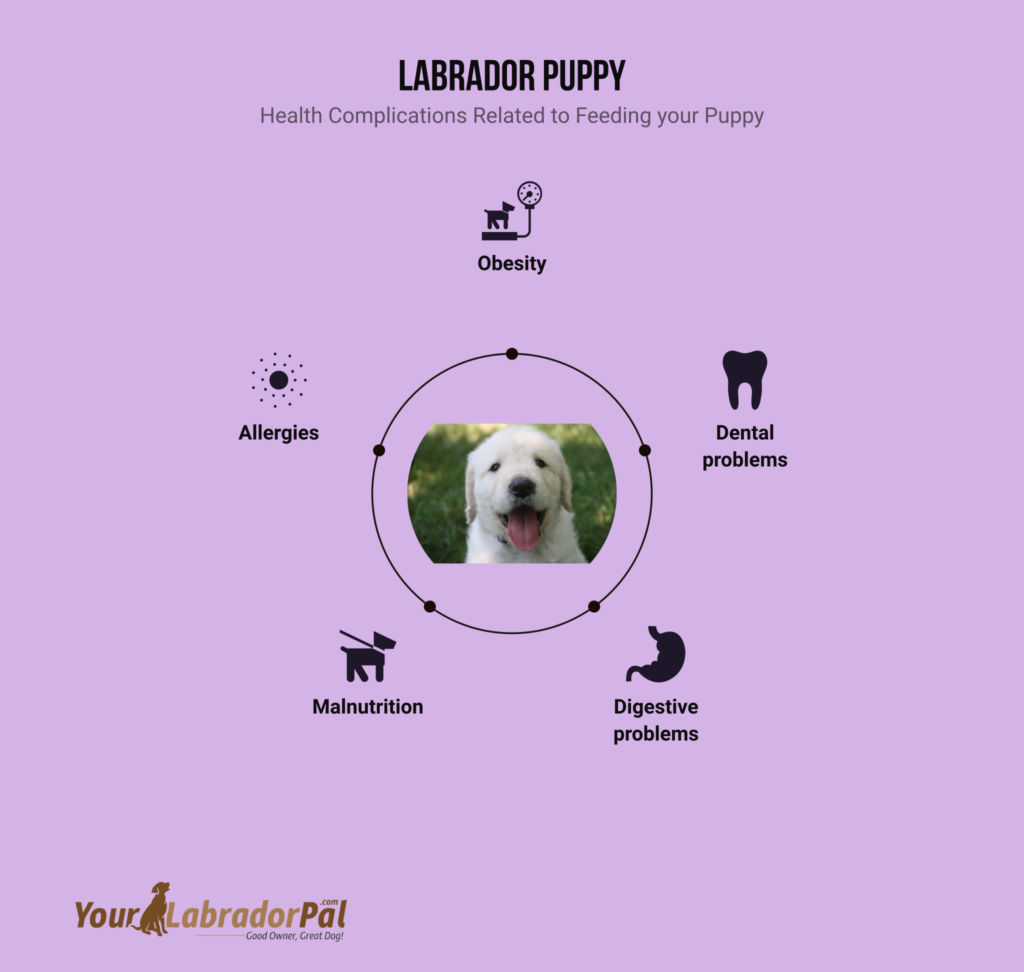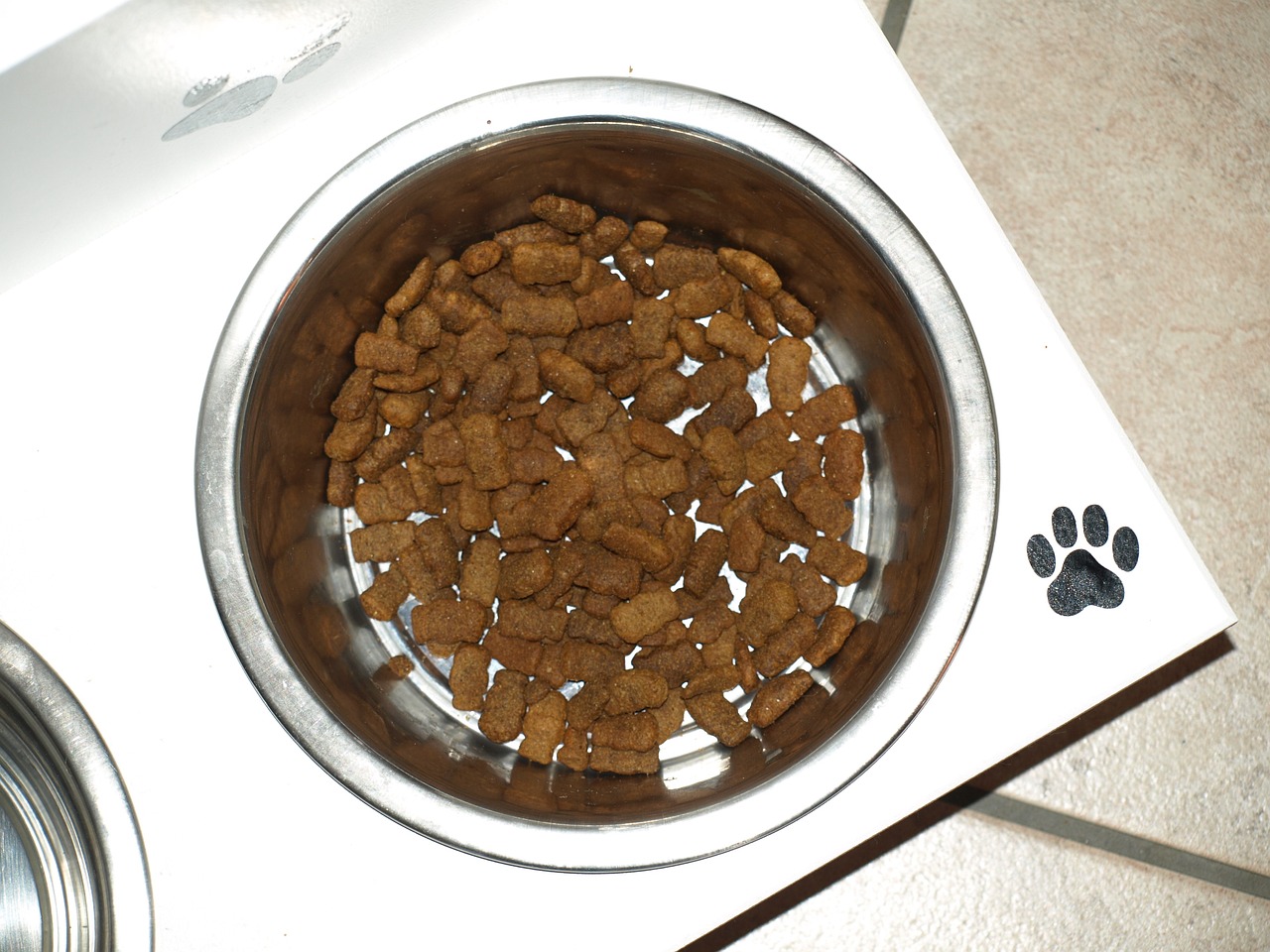Feeding A Labrador Puppy: How Often To Feed My Puppy
If you’re a new pet parent, you might be wondering about the best feeding schedule for your furry friend. Puppies are known for their boundless energy and endless curiosity, and proper nutrition is crucial for their growth and development. In this blog post, we’ll explore the topic of how often to feed your Labrador puppy and provide you with some helpful tips to ensure your pup stays healthy and happy. So, grab a cup of coffee, and let’s dive into the world of feeding a Labrador puppy!

Common Health Complications Related to Feeding a Labrador Puppy
Feeding your Labrador puppy the right way is crucial for their overall health and well-being. However, there are some common health complications that can arise if their diet is not properly managed. Here are a few health issues related to feeding your Labrador puppy that you should be aware of:
✤ Obesity
Labrador Retrievers are a breed that is known to love food, but overfeeding them can lead to obesity. This condition occurs when a dog’s body weight is 20% or more over its ideal weight. Obesity can have serious consequences for your Labrador’s health, such as putting extra stress on their joints and increasing their risk for other health issues such as diabetes and heart disease. To avoid this, it’s important to establish a feeding routine and stick to it. Avoid giving your puppy too many treats or table scraps, and choose a high-quality dog food that meets their nutritional needs.
✤ Gastrointestinal Problems
Feeding your puppy the wrong type of food or too much food can result in digestive issues such as vomiting, diarrhea, and constipation. Dogs have sensitive digestive systems, and changes in their diet can cause disruptions in their digestive process. To prevent these problems, gradually introduce new food to your puppy’s diet over several days, and avoid giving them table scraps or human food that can upset their stomach.
✤ Allergies
Just like humans, some Labradors may be allergic to certain types of food or ingredients. This can lead to skin irritations, itchiness, and gastrointestinal problems. If your puppy exhibits signs of an allergic reaction, such as scratching or licking, consult with your veterinarian to determine the source of the allergy and find an appropriate diet plan.
✤ Dental Problems
Feeding your puppy a diet high in sugar or starch can contribute to dental problems such as tooth decay and gum disease. It’s important to choose a dog food that is specifically designed to promote dental health and provide your puppy with dental chews and toys to help keep their teeth clean.
✤ Malnutrition
Feeding your puppy an inadequate diet can result in malnutrition, which can lead to stunted growth, a weakened immune system, and other health complications. To avoid malnutrition, make sure to choose a high-quality dog food that meets your puppy’s nutritional needs, and consult with your veterinarian to ensure that your puppy is getting the right amount of nutrients.
Feeding your Labrador puppy the right way is crucial for their overall health and well-being. By avoiding common health complications related to feeding and establishing a proper feeding routine, you can help ensure that your puppy grows up to be a healthy and happy companion.
Importance of A Regular Feeding Schedule for a Labrador Puppy

✦ Helps with Digestion and Metabolism
When your puppy is fed on a regular schedule, their bodies are able to regulate its digestive system and metabolism. This is because their body becomes accustomed to when it can expect food and is able to adjust accordingly. By feeding your puppy at the same time every day, you are setting a routine for their digestive system, which can help prevent digestive issues such as constipation, diarrhea, and bloating. A regular feeding schedule can also prevent overeating, which can lead to obesity and other health issues.
✦ Aids in Housebreaking
Puppies have small bladders and can’t hold their urine for long periods. Establishing a regular feeding schedule will help you predict when your puppy needs to go potty. Most puppies will need to go within 30 minutes after eating, so you can take them outside at that time and establish a routine for potty training. This consistency will make it easier for your puppy to learn where they should go potty and reduce the likelihood of accidents in the house.
✦ Makes Training Easier
A regular feeding schedule can help with training because your puppy will be less likely to become distracted by hunger during training sessions. If your puppy is hungry, it may become more interested in finding food than following your commands. However, if they know they will be fed at a specific time, they will be more focused on training and will be more likely to listen to your commands. Additionally, if your puppy has a regular feeding schedule, it will be less likely to act out due to hunger or frustration.
✦ Prevents Health Issues
Proper nutrition is crucial for your puppy’s growth and development, and a consistent feeding schedule will ensure they receive a steady supply of nutrients. Feeding your puppy too much or too little can lead to health problems such as obesity or malnutrition. By feeding your puppy on a regular schedule, you can monitor their food intake and adjust it as necessary. Additionally, a regular feeding schedule can help prevent digestive issues, as mentioned above.
✦ Promotes Overall Well-being
When your puppy is well-fed and on a regular feeding schedule, it will be happier and healthier overall. Puppies are growing and developing rapidly, and they need a consistent supply of nutrients to fuel their active lifestyles. A regular feeding schedule can help prevent health issues, improve digestion, and promote healthy growth and development. Additionally, when your puppy is on a regular feeding schedule, it will be less likely to become anxious or stressed about when its next meal will be, which can lead to a happier and more content pup.
How Often to Feed Labrador Puppy
To properly feed your Labrador puppy, establish a consistent feeding schedule. Puppies need frequent meals to support their growth and development. Feed them three to four times a day until they reach six months old, and then switch to twice a day.
The amount of food your puppy needs will vary based on age, weight, and activity level. Consult with your veterinarian to determine the appropriate amount of food for your puppy. Overfeeding can cause obesity while underfeeding can lead to malnutrition.
Stick to a routine when feeding your puppy. Feed them at the same time every day and make sure they always have access to fresh water. If you need to adjust their feeding schedule or amount, do so gradually to prevent digestive issues.
Factors that Can Affect the Frequency of Feeding a Labrador Puppy
Feeding a Labrador puppy requires careful consideration of various factors, including its age, weight, and activity level. Here are some factors that can affect the frequency of feeding your Labrador puppy:
✓ Age
Young puppies need to eat more frequently than adult dogs to support their rapid growth and development. Generally, Labrador puppies should be fed three to four times a day until they are six months old, and then twice a day thereafter.
✓ Weight
A puppy’s weight can impact the amount of food they need and how often it should be fed. A larger puppy may need more frequent meals, while a smaller puppy may be fine with fewer meals.
✓ Activity level
Puppies that are more active require more calories and may need to be fed more frequently. Consider your puppy’s exercise routine and adjust their feeding schedule accordingly.
✓ Health
If your puppy has a medical condition or is on medication, their feeding schedule may need to be adjusted to accommodate its needs. Consult with your veterinarian to determine the best approach.
✓ Environment
The temperature and humidity of your puppy’s environment can also affect their appetite and the frequency of feeding. Puppies may eat more frequently in colder environments to help regulate their body temperature.
Effective Tips to Feed Labrador Puppy With a Set Routine Schedule
Feeding your Labrador puppy can be a fun and rewarding experience, but it’s important to establish a set routine schedule to keep them healthy and happy. Here are some tips to make the feeding process a breeze:
◈ Let’s talk about portions
It’s crucial to determine the right amount of food for your puppy based on its age, weight, and activity level. Think of it like meal prep for your furry friend!
◈ Make a schedule
Puppies thrive on routine, so establish a consistent feeding schedule and stick to it. It’s like having a standing dinner date with your furry bestie!
◈ Food type matters
Consistency is key when it comes to food. Choose high-quality puppy food and stick to it. If you need to switch things up, introduce the new food gradually over several days.
◈ Say no to free-feeding
Avoid leaving food out all day for your puppy to graze on. Instead, measure out their portions using a measuring cup to avoid overfeeding.
◈ Treats are a thing
Treats can be an excellent way to bond with your puppy and reward them for good behavior but make sure they’re healthy and low-calorie. After all, treats are like dessert – they should be a special treat, not the main course.
◈ Watch the waistline
Keep an eye on your puppy’s weight and adjust their feeding schedule and portions accordingly. It’s like keeping track of your own weight and making sure your pants still fit!
By following these tips, you’ll establish a set routine schedule for feeding your Labrador puppy that supports their growth and overall health. And who knows, you might just find yourself looking forward to mealtime with your furry friend!
Common Mistakes to Avoid When Feeding a Labrador Puppy
Feeding your Labrador puppy can be a joyous experience, but there are some common mistakes that you’ll want to avoid to keep your furry friend healthy and happy.
➼ The “all-you-can-eat” buffet
Feeding your puppy as much as they want may seem like a good idea, especially if they’re still growing, but it can lead to health issues down the line. Labrador puppies are known to have a big appetite, but overfeeding can cause obesity, which can lead to a host of problems such as joint issues, heart disease, and diabetes. To avoid overfeeding, establish a regular feeding schedule and stick to it. Measure out their food portions using a measuring cup to ensure you’re not overfeeding, and provide them with enough exercise to burn off the calories.
➼ Switching up the menu too often
Puppies can be picky eaters, just like humans. It’s important to choose high-quality puppy food and stick to it. Avoid switching up their food too often, as it can cause an upset stomach or diarrhea. If you need to switch things up, do it gradually over time, mixing the new food with the old food over several days until your puppy adjusts. Also, avoid giving your puppy human food or table scraps, as it can cause digestive problems and lead to unhealthy habits.
➼ Ignoring their thirst
It’s important to keep your puppy hydrated. Make sure they always have access to fresh, clean water. Keep a bowl near their food and refill it often, especially during hot weather or after exercise. You can also add ice cubes to their water bowl to keep it cool and refreshing.
➼ Playing favorites with treats
Treats are a great way to bond with your puppy and reward them for good behavior, but it’s important not to go overboard. Choose healthy, low-calorie treats, and avoid playing favorites. Giving your puppy too many treats can lead to weight gain and cause unhealthy habits. Treats should be given in moderation and as a reward, not a bribe! Plus, giving them treats that are specifically designed for dental health can help keep their teeth and gums healthy.
➼ Not paying attention to their weight
Labrador puppies grow quickly, and their weight can fluctuate rapidly. It’s important to regularly monitor their weight to make sure they’re not gaining too much or too little. If you notice a change in their weight, adjust their food intake and feeding schedule accordingly. You can also consult with your veterinarian to determine the right amount of food for your puppy based on its weight, age, and activity level.
By avoiding these common mistakes, you’ll establish a healthy and happy feeding routine for your Labrador puppy. Remember, your puppy’s diet and feeding habits play a crucial role in its overall health and well-being. So, take the time to establish a routine and stick to it. With a little patience and consistency, you’ll have a happy and healthy furry friend by your side for years to come!
Bonus: Labrador Puppy Nutritional Needs
Labrador puppies have specific nutritional needs to support their growth and development. Here are some important nutritional factors to consider when feeding a Labrador puppy:
⦿ Protein
Protein is a crucial component of a Labrador puppy’s diet as it helps support its muscle development and repair. Puppies require more protein than adult dogs to keep up with their rapidly growing bodies. Look for puppy food that contains high-quality protein sources, such as chicken, fish, or lamb. These proteins are easier to digest and provide essential amino acids that your puppy needs for healthy growth. Make sure the food contains at least 22% protein, but don’t go overboard, as excess protein can lead to weight gain and other health problems.
⦿ Fat
Fat is a vital source of energy for your puppy and helps maintain healthy skin and coat. However, too much fat can lead to obesity, which can put extra stress on your puppy’s developing bones and joints. Look for puppy food with healthy sources of fat, such as chicken fat or fish oil. Avoid foods that contain excessive amounts of fat or unhealthy fats like trans fats. Aim for a minimum of 8% fat in your puppy’s diet, and make sure to choose a food with the right balance of protein and fat to support their growing bodies.
⦿ Carbohydrates
Carbohydrates are a source of energy and fiber, but they should not make up the majority of your puppy’s diet. Look for puppy food with easily digestible carbohydrates, such as brown rice or sweet potato. Avoid foods with corn or wheat, as these can be difficult for puppies to digest and can cause digestive issues like bloating or gas. Remember that too many carbs can also lead to weight gain, so choose a food that has a balance of carbs, protein, and fat.
⦿ Vitamins and minerals
Puppies require a wide range of vitamins and minerals to support their overall health and growth. Look for puppy food with added vitamins and minerals, such as calcium and phosphorus, to support bone growth. These nutrients are essential for your puppy’s developing body, but they must be in the right balance. Always follow feeding guidelines and avoid giving your puppy extra supplements unless recommended by your veterinarian.
⦿ Water
Water is crucial for your puppy’s overall health and is essential for many of its bodily functions. Make sure your puppy has access to fresh, clean water at all times, and monitor their water intake throughout the day. This is especially important during hot weather or after exercise, when your puppy may become dehydrated. Don’t forget to clean your puppy’s water bowl regularly to prevent bacteria buildup.
By choosing high-quality puppy food that meets your Labrador puppy’s specific nutritional needs and feeding them a balanced diet, you can help them grow into a healthy, happy adult dog. Remember to consult with your veterinarian for personalized advice and recommendations for your puppy’s unique needs.
Sample Feeding Table for Your Labrador Puppy
| Age (Months) | Number of Meals per Day | Amount per Meal |
| 2-3 | 4 | 1/4 – 1/3 cup |
| 4-5 | 3 | 1/3 – 1/2 cup |
| 6-8 | 2 | 1/2 – 1 cup |
| 9-12 | 2 | 1 – 2 cups |
Please note that this is just a general guide and that your puppy’s individual needs may vary based on factors such as activity level, metabolism, and overall health. Always consult with your veterinarian to determine the appropriate feeding plan for your puppy. It’s also important to weigh your puppy regularly and adjust their food intake accordingly to maintain a healthy weight.
Final Words
Now that you know the importance of establishing a regular feeding schedule for your Labrador puppy, as well as the factors that can affect their feeding frequency and some tips to help you maintain a consistent routine, you’re well on your way to providing your furry friend with the nourishment they need to thrive.
Remember, feeding your puppy a nutritious and balanced diet is crucial for their growth and development, and setting a schedule can also help with house training and overall behavior. By following the feeding table and tips we’ve provided, you can ensure that your puppy is getting the right amount of food at the right time.
Of course, every puppy is unique, so it’s always a good idea to consult with your veterinarian to determine the best feeding plan for your individual dog. With a little bit of patience, care, and attention, you can help your Labrador puppy grow up to be a healthy, happy, and well-fed companion.
Frequently Asked Questions
Can I give my Labrador puppy treats?
Yes, you can give your puppy treats, but in moderation. Treats should not make up more than 10% of your puppy’s daily caloric intake, and you should choose treats that are specifically designed for puppies.
How do I know if my puppy is getting the right nutrition?
Consult with your veterinarian to ensure that your puppy’s diet is meeting its nutritional needs. You can also monitor your puppy’s weight and growth to ensure that they are developing at a healthy rate.
Can I feed my puppy a homemade diet?
It’s possible to feed your puppy a homemade diet, but it’s important to consult with your veterinarian to ensure that their nutritional needs are being met. Homemade diets require careful planning and preparation to ensure that your puppy is getting the right balance of nutrients.









